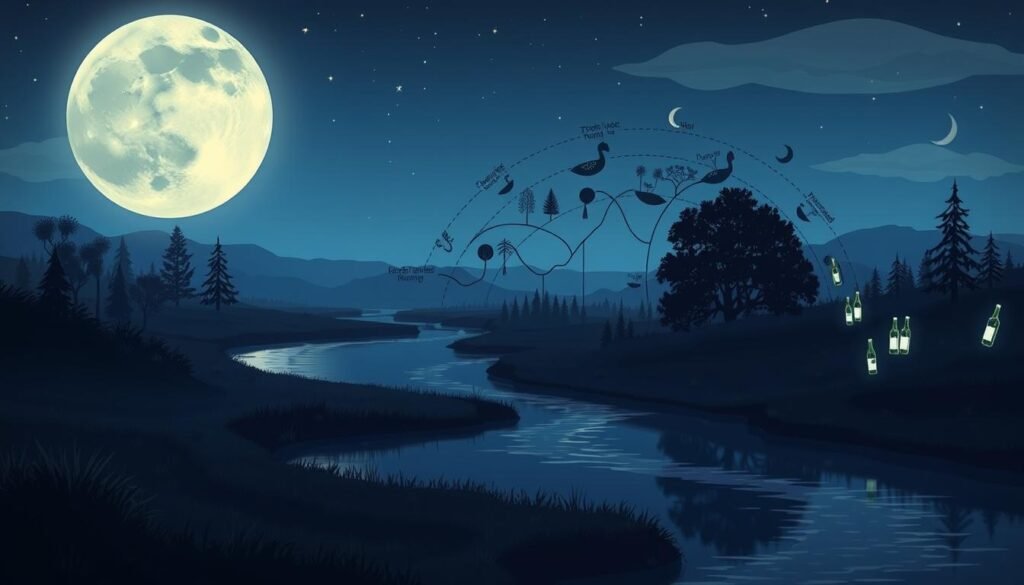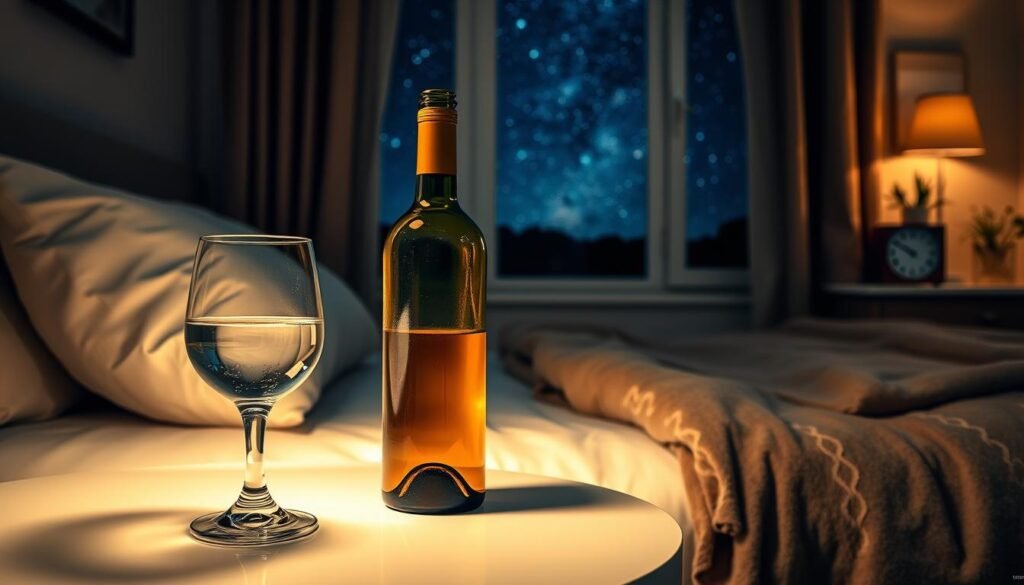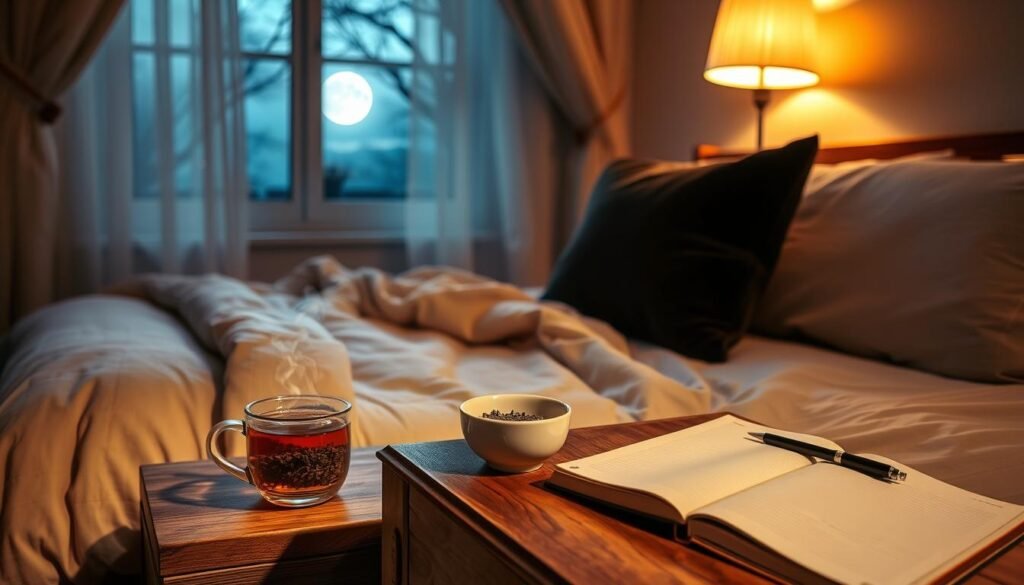Did you know that over half the adults in the US recently had a drink? Many think a little alcohol helps them relax after a long day. But, the effect of alcohol on how well you sleep can be shocking. Drinking too much often leads to poor sleep. It messes with your body’s sleep patterns. This makes you feel tired and unrested the next day. If you drink more than what’s suggested, you’ll spend less time in REM sleep. This is important for feeling rested when you wake up.
In this article, we’ll look into how alcohol and sleep are connected. We’ll see how drinking affects sleep structure, leads to long-term sleep problems, and affects overall health. It’s important to know this to better your sleep and live a healthy life.
Key Takeaways
- More than half of U.S. adults consumed alcohol recently, affecting sleep quality.
- Exceeding low-risk drinking guidelines can lead to sleep deprivation.
- Alcohol disrupts REM sleep, impairing refreshing rest.
- Chronic alcohol consumption is linked to insomnia and other sleep disorders.
- Mindful drinking practices can mitigate negative effects on sleep.
Understanding Sleep Cycles
Understanding sleep cycles is key to getting good rest. Each cycle has non-rapid eye movement (NREM) and rapid eye movement (REM) stages. These stages play a big role in our health and mental state.
The Importance of Deep Sleep and REM Sleep
Deep sleep helps our body repair itself and strengthens our memories. It fixes tissues, helps muscles grow, and makes bones stronger. REM sleep is crucial for our brains. It helps with learning and making decisions.
A balance of both deep and REM sleep is vital. It lets our body and mind refresh.
How Sleep Cycles Function
A sleep cycle usually lasts from 90 to 120 minutes. We go through different stages several times each night. From light to deep, then to REM sleep. This pattern is key to restorative sleep.
Understanding sleep cycles shows how things like light and stress affect sleep. Good sleep habits are essential. To improve sleep, check out better sleep hygiene tips.
Alcohol’s Effect on Sleep Quality
Learning how alcohol and sleep quality are connected shows major effects on sleeping patterns. Alcohol makes it hard for people to go through different sleep stages, leading to choppy sleep.
Disruption of Sleep Architecture
Alcohol messes with our sleep by altering sleep cycles. At first, high levels of alcohol result in a deep, dreamless sleep. This happens because it affects neurotransmitters.
But, as the night goes on and alcohol levels drop, brain activity goes up. This leads to restless sleep and waking up often. Many people find alcohol makes their sleep worse, with nearly 90% facing sleep issues. Alcohol also makes you urinate more, causing more bathroom visits at night. This is more common in older people.
Impact on REM Sleep
Drinking alcohol greatly affects REM sleep. This is the part of sleep that helps with dreaming and thinking clearly. As you drink more, you spend less time in REM sleep. Research shows that a little alcohol lowers sleep quality by 9.3%, a moderate amount by 24%, and a lot by nearly 40%.
This loss of REM sleep makes it hard to feel awake and sharp the next day. The effects of drinking hit everyone, no matter their age or how active they are. Young folks especially struggle with losing REM sleep.
How Alcohol Impacts Sleep Onset
Understanding how alcohol affects sleep can make a big difference in how well you sleep. Alcohol may seem like it helps you fall asleep faster at first. Yet, this benefits only for a short time and can worsen sleep quality in the long run. While it’s true that alcohol can make you feel more relaxed and fall asleep quicker, depending on it can mess up your sleep cycle.
Initial Sedative Effects of Alcohol
Drinking alcohol can make you fall asleep quicker by making it easier to fall asleep. This is because it acts as a sedative at first. But, this effect doesn’t last all night. The body starts to break down the alcohol, and about four to five hours later, you might find yourself waking up or sleeping poorly.
Short-Term vs. Long-Term Effects
Drinking alcohol might help you fall asleep faster in the beginning. But over time, it can hurt how well you sleep. Research shows that 20% to 30% of people use alcohol to deal with insomnia. Alcohol may seem helpful at first, but using it a lot can actually make insomnia worse. People who drink heavily could mess up their sleep cycle completely and have a higher chance of developing sleep disorders.
Let’s compare the short-term and long-term effects:
| Effect Type | Short-Term Effects | Long-Term Effects |
|---|---|---|
| Sleep Onset | Faster sleep initiation | Increased insomnia rates |
| Sleep Quality | Initial relaxation | Decreased REM sleep duration |
| Health Risks | Lower likelihood of sleep disturbances | Higher risk of obstructive sleep apnea and chronic insomnia |
| Dependence | Temporary relief from sleep issues | Emotional and physical dependence on alcohol |
The Link Between Alcohol and Insomnia
Drinking alcohol can really mess with your sleep, often leading to insomnia and other sleep issues. This creates a tricky cycle between drinking and sleep problems. Knowing how alcohol affects sleep is key for those wanting to rest better.
Chronic Sleep Problems Associated with Heavy Drinking
Drinking a lot is tied to many sleep problems. Studies show that guys having over two drinks, and ladies more than one, see their sleep quality drop. This can lead to signs of insomnia. Long-term drinking affects sleep in different ways:
- Increased risk of sleep apnea by 25%
- Frequent awakenings at night because you need the bathroom more
- Broken sleep patterns due to messed up REM sleep
- More chances of vivid dreams from changes in sleep stages
Temporary Insomnia and Alcohol Withdrawal
Trying to quit alcohol often brings on temporary insomnia. People cutting back on drinking usually find their sleep disrupted. This makes quitting alcohol even harder. Here’s what they might face:
- Poorer sleep quality, making it hard to stay asleep
- Waking up a lot during the night
- Ongoing insomnia even after stopping heavy drinking
These withdrawal signs can slow down recovery. They show the need for special support for those fighting alcohol use issues.
Relationship Between Alcohol and Sleep Disorders
Many people need to understand how alcohol affects sleep. Drinking can worsen sleep problems like sleep apnea. It can also cause sleep disorders due to its effects. While alcohol might help you relax at first, it often harms your sleep quality later.
Impact on Sleep Apnea Symptoms
Drinking alcohol makes sleep apnea symptoms worse. It relaxes throat muscles, which can block your airway while sleeping. Even a little alcohol increases this risk. The CDC reports that one-third of Americans have sleep issues, partly because of drinking.
Alcohol-Induced Sleep Disorders
Alcohol doesn’t just affect sleep apnea. It’s also linked to insomnia and uneven sleep patterns. Many with alcohol dependency can’t sleep well, with up to 91% suffering from insomnia. Using alcohol to sleep can cause lasting sleep disorders. It harms your health over time. High alcohol use especially leads to bad sleep quality. This shows the need to study how drinking impacts sleep more closely. Read more about this here.
Circadian Rhythms and Alcohol Consumption
Circadian rhythms are key in controlling our sleep and overall health. Drinking alcohol can change these natural cycles. This leads to problems with sleep quality. It’s important to know how this happens to understand its effects on melatonin. Melatonin helps us sleep.
How Alcohol Alters Biological Clocks
Alcohol messes with our body’s natural timekeeping, or biological clocks. This can throw off our natural day and night rhythms. For example, people who drink often might go to bed later. This inconsistency in sleep times can harm our health and happiness over time.
Effects on Melatonin Production
Studies show alcohol affects melatonin, which is vital for sleep. Normally, as night falls, our melatonin levels go up, signaling it’s time to sleep. But, alcohol can lower melatonin levels. This makes it hard to fall and stay asleep. Many find that using alcohol to sleep actually causes more sleep problems.

| Impact of Alcohol on | Circadian Rhythms | Melatonin Production |
|---|---|---|
| Sleep Timing | Leads to irregular sleep patterns | Decreases melatonin secretion |
| Sleep Quality | Compromised development of deep sleep | Delays sleep onset and increases disruptions |
| Overall Health | Increases risk of long-term sleep disorders | Affects overall sleep recovery and restfulness |
Understanding how circadian rhythms, biological clocks, and melatonin work together is key for good sleep. Managing alcohol intake might be vital for keeping these systems in balance.
Excessive Alcohol Consumption and Sleep Deprivation
Drinking too much alcohol can really mess with your sleep. It might seem like it helps you get to sleep at first. But soon, it disrupts your rest, leaving you tired. This can start a tough cycle where you’re drinking to sleep, but end up sleeping worse.
The Vicious Cycle of Sleep Debt
Drinking alcohol before bed can seem helpful for falling asleep. Yet, this benefit doesn’t last, making your sleep quality drop during the night. Excessive drinking messes with important sleep cycles. It results in restless nights, more wake-ups, and less deep sleep.
Consequences of Repeated Sleep Loss
Constant lack of sleep from drinking too much doesn’t just make you tired. It can make it hard to think clearly, pay attention, and make good decisions. You might also find yourself feeling super sleepy during the day, hurting your daily life. Cutting back on alcohol can help get your sleep back on track. Studies show getting help for alcohol issues can improve sleep and break the cycle of sleep debt linked to excessive drinking.
| Effect | Outcome |
|---|---|
| Excessive Alcohol Consumption | Disrupted Sleep Architecture |
| Sleep Debt | Cognitive Impairments |
| Repeated Sleep Loss | Increased Daytime Sleepiness |
| High Alcohol Intake Before Bedtime | Reduced REM Sleep |
Best Practices for Drinking and Sleep
Understanding how alcohol impacts sleep is key. It helps us make smart choices about drinking. Following best practices for drinking can boost sleep patterns and overall health. The time when you drink matters a lot for sleep.
Recommendations on Timing of Alcohol Consumption
A fundamental tip is to avoid alcohol three to four hours before bed. This gap gives your body time to process the alcohol. It usually takes about an hour to metabolize one serving. By doing this, you stop alcohol from ruining your sleep quality and keep your sleep cycle normal.
Strategies to Minimize Alcohol’s Impact on Sleep
There are ways to drink without harming your sleep. Drink water in the evening to fight the dehydrating effects of alcohol. Also, stick to a regular sleep schedule and practice good sleep habits, like limiting screen time before bed. This promotes better sleep quality.
For help with alcohol, check out the NIAAA Alcohol Treatment Navigator. Joining support groups can also offer insights into treatment choices.

Signs of Alcohol-Related Sleep Disruptions
Alcohol can mess with your sleep, leading to problems. It’s important to know these signs to understand the impact on health. Two signs are waking up a lot and sleeping restlessly. Both disrupt your natural sleep, making it hard to get good rest.
Recognizing Frequent Wakings
Waking up often at night is a key sign of alcohol messing with your sleep. People who drink, especially at night, tend to wake up a lot. Almost 90% of evening drinkers face sleep issues. These wake-ups break up your sleep, hurting your day. This lack of rest can lead to more drinking, creating a harmful cycle.
Identifying Patterns of Restless Sleep
Restless sleep is another big issue from drinking. Heavy drinkers bounce between sleep stages instead of sleeping well. Between 36% and 72% of people getting help for alcoholism have insomnia, often due to their drinking. Over time, this restless sleep can worsen your mood and thinking skills.
| Type of Disruption | Percentage of Affected Individuals |
|---|---|
| Frequent Wakings | 90% |
| Insomnia Symptoms in Alcoholics | 36% – 72% |
| Sleep Apnea Occurrence | More frequent in alcoholics |
| Restless Sleep Patterns | Common in heavy drinkers |
Alternatives to Alcohol for Sleep Improvement
Exploring ways to sleep better without alcohol can make you healthier. If you’re looking for good sleep, check out natural aids and how to relax better. These can help you sleep more deeply and feel more rested.
Natural Sleep Aids and Techniques
Natural sleep aids are becoming more popular. Here are some common ones:
- Melatonin: Helps control when you sleep and wake up.
- Valerian Root: Calms you down and may help you fall asleep faster.
- Magnesium: Good for relaxing, it can make your sleep better.
- Essential Oils: Oils like lavender create a peaceful place to sleep.
Use these alternatives at night to improve your sleep.
Creating a Healthy Nighttime Routine
Having a good bedtime routine helps you sleep better. Do the same things each night to tell your body it’s time to sleep. Important steps include:
- Go to bed and get up at the same time every day.
- Stop using screens an hour before sleep.
- Do relaxing things before bed, like reading or mindfulness.
- Don’t eat big meals or drink caffeine in the evening.
- Exercise regularly, it’s good for your sleep and health.

| Natural Sleep Aid | Benefits | Usage Tips |
|---|---|---|
| Melatonin | Regulates sleep cycles | Take 30 minutes before bedtime |
| Valerian Root | Helps reduce sleep onset time | Can be consumed as tea or supplement |
| Magnesium | Promotes relaxation | Include foods like nuts and leafy greens in your diet |
| Essential Oils | Creates a soothing sleep environment | Use in a diffuser or apply topically |
Conclusion
Various studies have shown how drinking alcohol affects our sleep. This affects our overall health too. Drinking even a little bit of alcohol can stop sleep from helping us recover. Just one drink can reduce how well we sleep by 24%. If someone drinks a lot, it can lessen the quality by 39.2%. This is true for many different people.
Drinking in moderation is key to better sleep. Women should limit themselves to one drink a day, and men to two. These limits show how important it is to be aware of how much we’re drinking. Drinking too much can make us feel sleepy during the day. It can also make our sleep quality worse. Young people are especially at risk from drinking too much.
Thankfully, there are better choices than alcohol for good sleep. Making these choices improves our sleep and overall health. By looking into natural sleep aids and healthy habits, we can avoid the bad effects of alcohol. This makes our lifestyles healthier. We’ll also have better sleep. For more information, see this detailed study on alcohol consumption and sleep.